Key takeaways:
- Understanding participant motivations enhances workshop engagement by fostering purpose and community.
- Incorporating interactive elements and varied presentation styles keeps energy levels high and caters to different learning preferences.
- Active feedback and creating a collaborative environment make participants feel valued and motivated, encouraging deeper engagement.
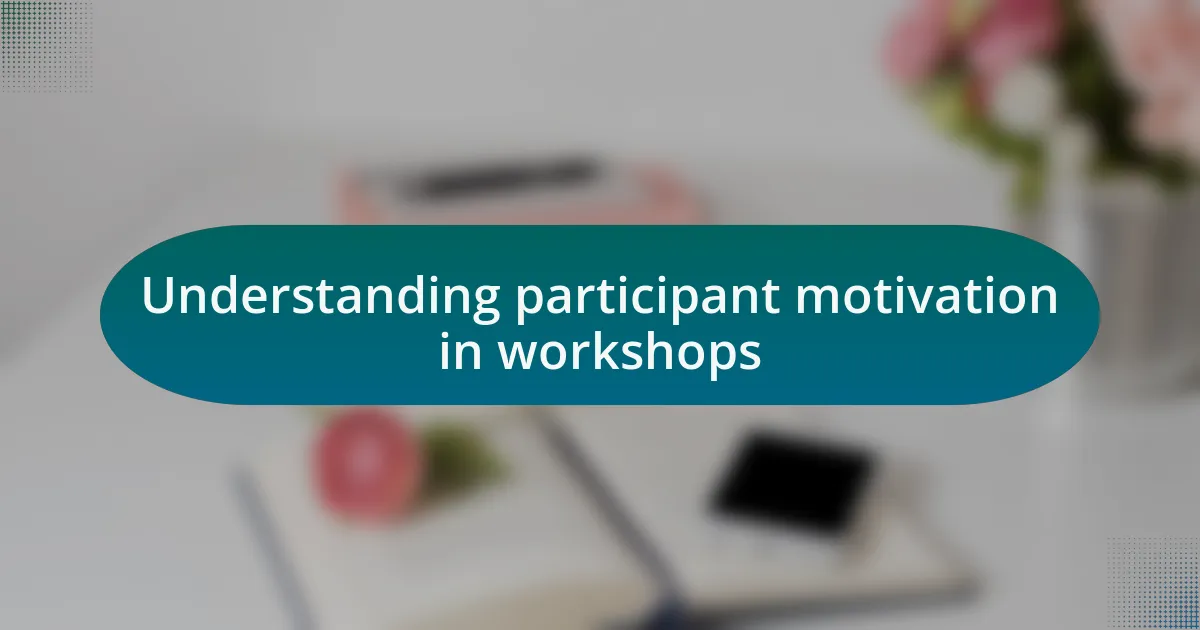
Understanding participant motivation in workshops
Understanding participant motivation in workshops is crucial for creating engaging experiences. I recall one workshop I facilitated where participants shared their goals beforehand. This simple step transformed the atmosphere; it fostered a sense of purpose and community that drove engagement.
Think about the last workshop you attended. What initially drew you in? For many, it’s the opportunity to gain new skills, network, or solve specific problems. By tapping into these motivations, I strive to design sessions that resonate with participants’ aspirations, making the content not just applicable but also personally valuable.
Sometimes, I wonder if the secret lies in creating a safe space for sharing. In one instance, I encouraged open dialogue by sharing my own experiences with failure in tech projects. This vulnerability prompted participants to open up about their struggles, which fostered a collaborative spirit and heightened motivation for the journey ahead. Engaging participants like this not only sparks interest but builds a community focused on collective growth.
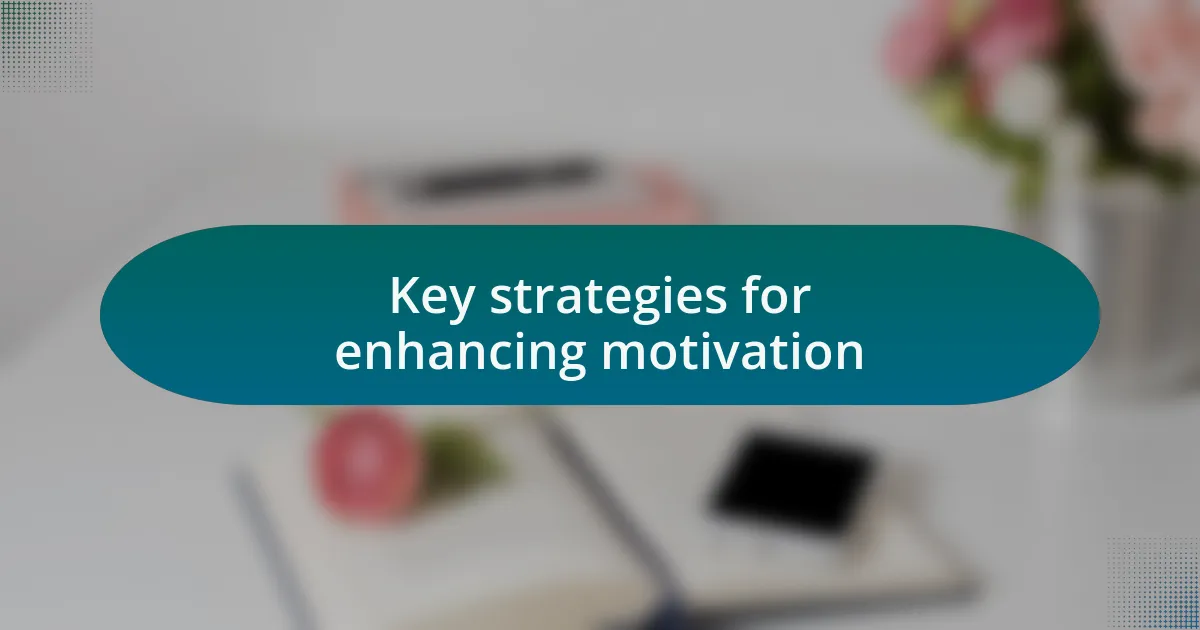
Key strategies for enhancing motivation
One effective strategy I use to enhance motivation is incorporating interactive elements. During a recent workshop on emerging technologies, I used real-time polls to gauge participants’ interest in various topics. This approach not only invited their input but also adjusted the session content on the fly, making attendees feel like they were co-creators of their learning experience.
I have found that sharing success stories can also be incredibly powerful. Once, I invited a former participant to share how a concept from my workshop helped them launch a successful project. Watching their pride as they recounted the journey not only inspired current attendees but also created a ripple effect of motivation throughout the room. Doesn’t it feel uplifting to hear how others have transformed their aspirations into achievements?
Another key element is setting clear, achievable goals for participants. I always encourage attendees to define what they want to take away from the workshop. In one session, I had each person jot down a specific goal on sticky notes and place them on a goals board. This visual representation served as a constant reminder of their commitments, creating an atmosphere charged with accountability and excitement. By seeing their goals among peers, they were collectively motivated to strive toward personal breakthroughs.
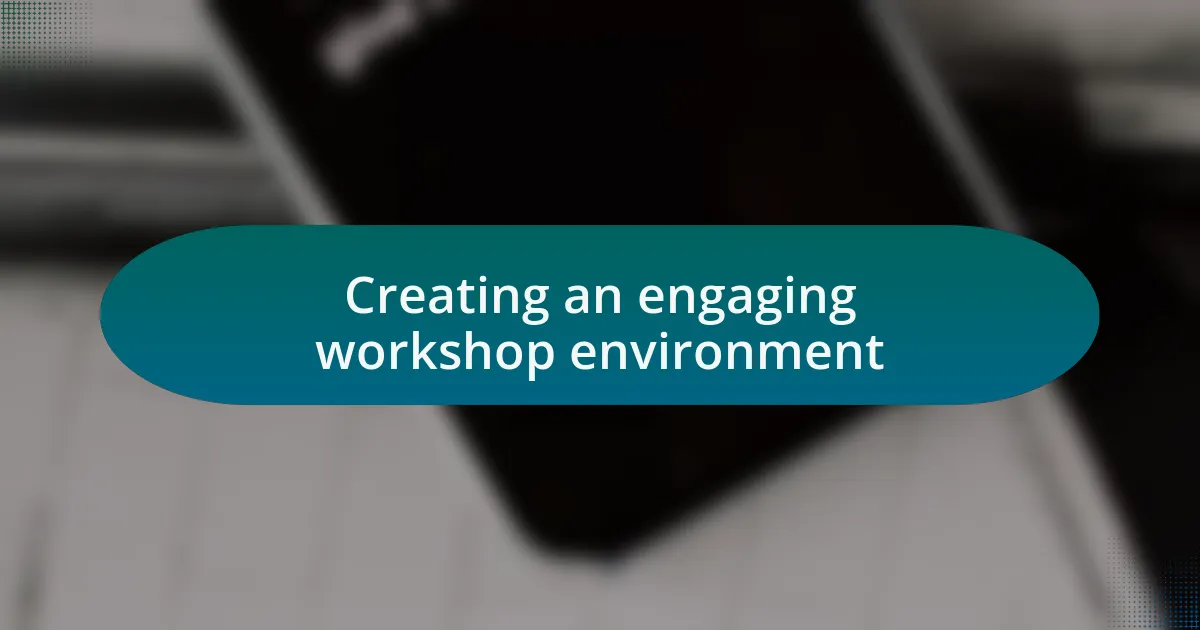
Creating an engaging workshop environment
Creating an engaging workshop environment truly makes a difference in participant motivation. I recall a time when I transformed a stale room into a vibrant space by rearranging furniture to foster conversations and interactions. It was rewarding to witness participants sitting in clusters, exchanging ideas in a relaxed manner; the energy in the room shifted palpably. Isn’t it amazing how a simple change in layout can stimulate creativity and collaboration?
Lighting can also dramatically affect the atmosphere. In one workshop, I experimented with softer lighting and added some plants to the space, creating a more inviting ambiance. When participants entered, they seemed to breathe a little easier, sparking more open dialogue and a willingness to share thoughts. I often wonder, how much does our environment influence our mindset and openness to learning?
Lastly, a warm welcome and personal connection set the stage for an engaging experience. At the start of my sessions, I make it a point to learn each participant’s name and interests. During a recent tech workshop, I shared a relevant personal story related to their experiences, which not only broke the ice but also made attendees feel valued. This connection can foster a sense of belonging, encouraging everyone to participate actively. Wouldn’t you agree that feeling personally connected to a workshop can elevate the entire learning experience?
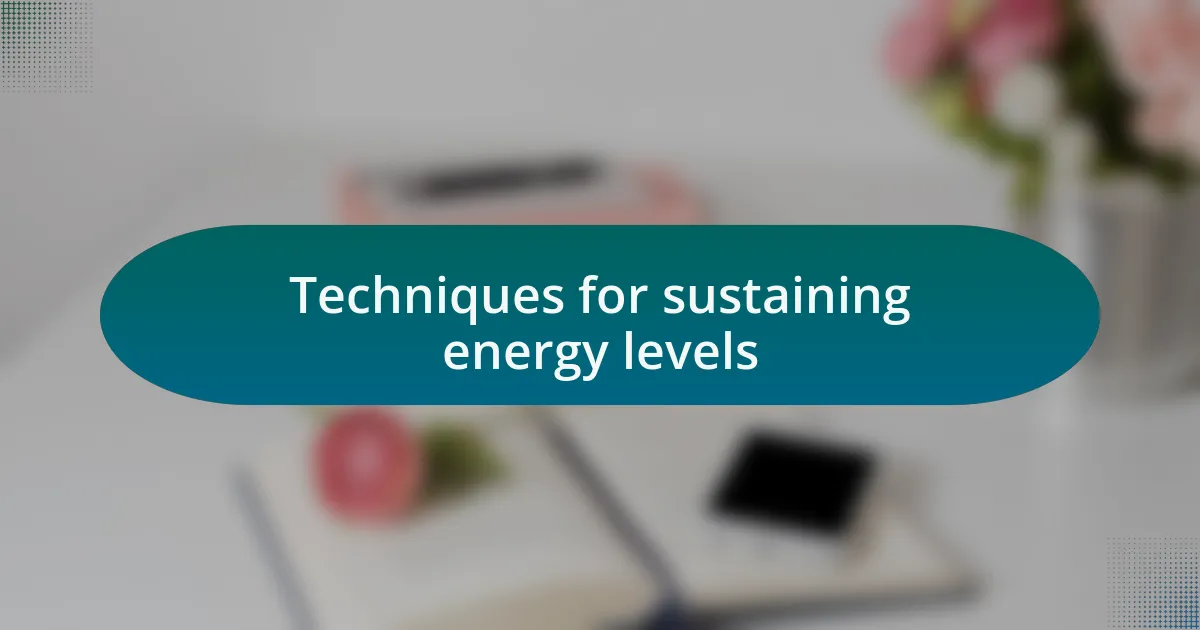
Techniques for sustaining energy levels
To sustain high energy levels throughout a workshop, I often incorporate interactive activities that get participants moving and engaged. For instance, during a session on emerging technologies, I introduced a quick brainstorming exercise where attendees had to stand up and pitch their ideas to their neighbors. It was fascinating to see how this brief shift in physical activity ignited enthusiasm, leading to lively discussions that kept everyone alert.
I also believe in the power of regular breaks to help recharge mental batteries. In one instance, after intense sessions on complex topics, I scheduled a short five-minute stretch break. I encouraged everyone to do a few light stretches or even take a quick walk around the room. I noticed an immediate difference; the participants returned with refreshed minds and sparked creativity, ready to tackle the next topic with renewed focus. Have you ever felt the impact of a simple stretch on your own productivity?
Another technique I utilize is varied presentation styles that cater to different learning preferences. I remember a workshop where I alternated between visual presentations, hands-on activities, and collaborative discussions. This not only kept the atmosphere lively but allowed every participant to engage in a way that resonated with them. It made me realize how diverse our energy sources are, and finding what fuels each individual can enhance the overall momentum of the workshop.
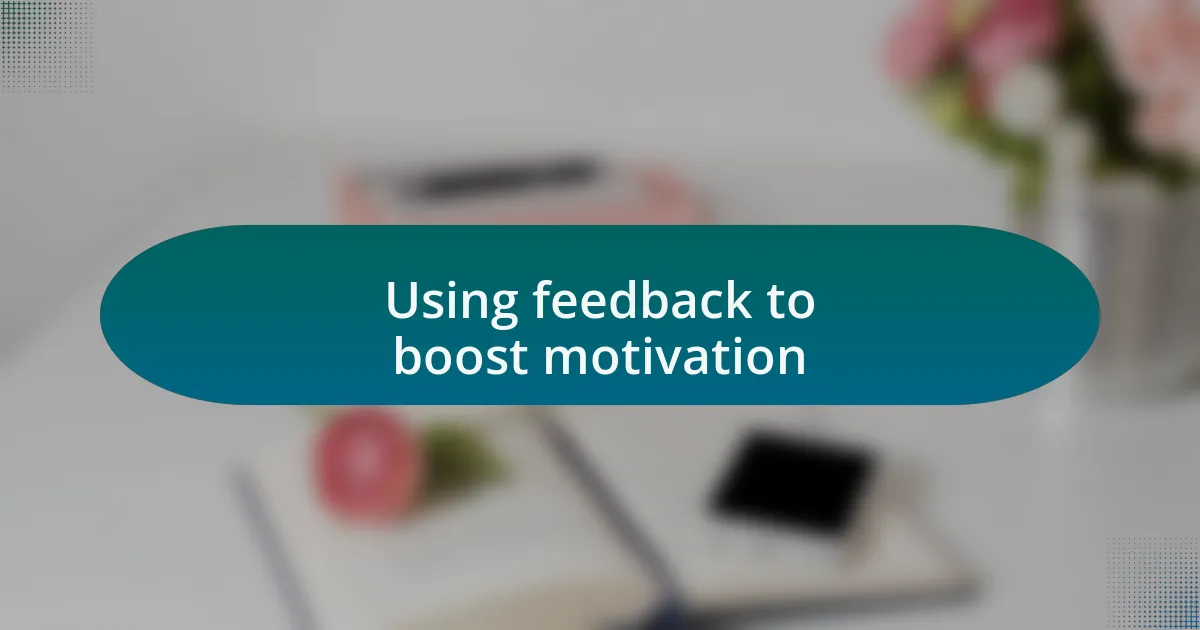
Using feedback to boost motivation
Using feedback is one of the most effective ways to boost motivation in my workshops. After each session, I solicit feedback from participants about what worked and what didn’t. On one occasion, I implemented a simple feedback form that asked attendees to rate different aspects of the workshop. When I shared the positive comments and constructive criticism with the group, it created a sense of ownership, and participants felt motivated to engage more deeply in future activities.
Additionally, I make it a point to act on the feedback I receive. I recall a session where participants expressed a desire for more hands-on activities. The next time I ran a workshop, I integrated their suggestions and structured an entire segment around practical applications of the concepts discussed. Watching their excitement as they actively participated was a rewarding experience that reinforced the idea that participant input truly shapes the atmosphere of the workshop.
I often wonder how impactful it can be for participants to see their feedback reflected in real changes. This two-way communication not only enhances their experience but also fosters a collaborative spirit. Have you ever noticed how empowered you feel when your suggestions lead to tangible improvements? It’s this feeling that I strive to nurture, ensuring that everyone leaves the workshop feeling valued and motivated to learn more.
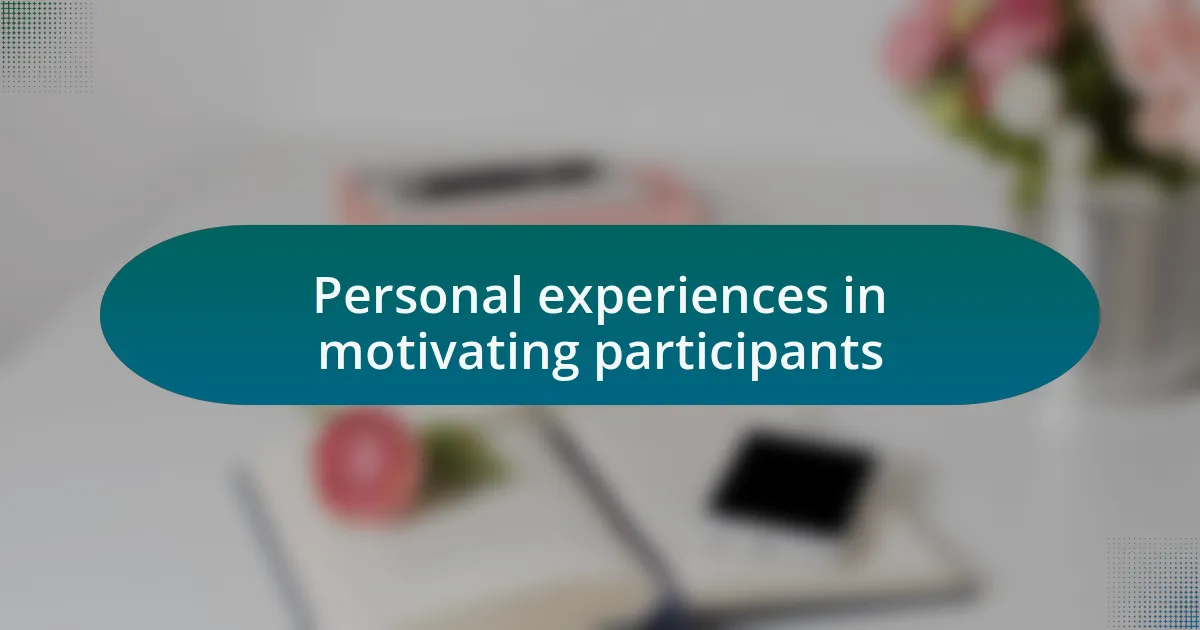
Personal experiences in motivating participants
I remember a specific workshop where I recognized that participants were losing steam midway through the session. To reignite their enthusiasm, I introduced a game designed to be both fun and relevant to the topics we were discussing. Watching the participants shift from fatigue to laughter was a powerful reminder of how important it is to balance learning with enjoyment. Can you recall a time when something as simple as a game turned a dull moment into an engaging experience?
Another instance that stands out was when I held a brainstorming session for a project. I noticed that the quieter members were hesitant to share their ideas, so I created smaller breakout groups, allowing them to voice their thoughts more comfortably. The moment I saw their faces light up when their ideas were incorporated into the group discussion, I felt a sense of fulfillment. It was an important moment; it was clear that creating an inclusive environment is crucial for participant motivation.
Emphasizing personal stories during workshops has also proven effective for me. For example, I shared my own challenges in adopting new technologies and how perseverance led to success. When I saw attendees nodding and resonating with my experience, it reinforced the idea that everyone can relate to struggles and triumphs. How often do we learn best from each other’s stories, rather than just facts? That connection can truly elevate motivation levels in any workshop setting.